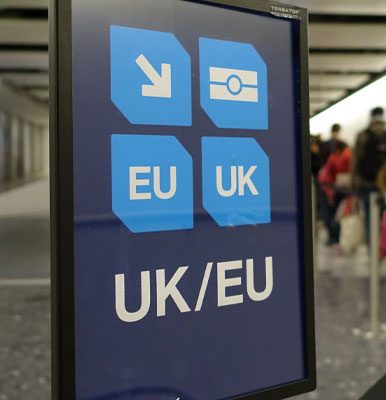What you need to know about time outside the UK and your EU Settlement Scheme application
Written by: Sarah McKeeve

Will time outside of the UK affect my settled status application?
As we reach five years since the EU Settlement Scheme fully opened to the public, more and more pre-settled status holders are becoming eligible to apply for settled status. While this should be straightforward for most, eligibility can be affected by various factors.
To qualify for settled status a person must complete a ‘continuous qualifying period’ of five years UK residence. For most applicants, the greatest threat lies in spending time out of the UK. Too much time outside of the UK can break a person’s ‘continuous qualifying period’ meaning that they cannot progress from pre-settled to settled status.
This area of the law is complex and there is little case law clarifying elements of continuous residence, meaning the interpretation of some clauses could be subject to future litigation. The Home Office also can change policy to be more generous than what is required by the Withdrawal Agreement (conversely, the EU Settlement Scheme rules and policy can never be more restrictive than what is provided for in the Withdrawal Agreement).
Even if you think that your case may fall foul of the rules as set out below, we strongly recommend that you seek expert advice on these matters.
So, how long may be too long? How many days outside of the UK can put an application in jeopardy? In this article, we will provide guidance as to how absences can affect eligibility for settled status.
What do the rules say about absences?
Appendix EU of the Immigration Rules, which sets out all of the rules for the EU Settlement Scheme, defines a ‘continuous qualifying period’ firstly as “a period of residence which began before 11pm on 31 December 2020” (the end of the transition period, though this date not apply to joining family members). Secondly whilst a person is building up their period of five years of continuous UK residence (that began by 31 December 2020), they must break their residence by absences from the UK exceeding a total of six months in any 12-month period, subject to certain exceptions. Absences that will break continuous residence can be a single absence of more than 6 months or multiple absences that cumulatively are more than 6 months in a 12 month period.
This means that, in general, to be eligible for settled status, you must have started living in the UK by 31 December 2020, and you must have been resident in the UK for a period of five years. Within those five years, you must not have been absent from the UK for more than 6 months within any 12-month period unless the exceptions set out below apply.
What are the exceptions to this rule, and when do they apply?
Appendix EU provides some exceptions when lengthy absences will not break an applicant’s continuous qualifying period of residence.
Single absences of more than six months but less than 12 months
A single absence of up to12 months, may be disregarded where that absence was for an “important reason”. The Home Office examples of important reasons may include circumstances such as;
- Pregnancy
- Serious ill-health
- Study
- Vocational training
- An overseas posting
- Covid-19
These are not the only reasons that are valid within the Home Office rules and guidance – these are just examples provided, and other reasons may be accepted. This means that if the reason for the extended absence was “important” to the applicant, it may be possible to justify this to the Home Office with evidence and a written explanation of the “importance” of the reason for the absence.
In light of the impact of the COVID-19 pandemic and its related travel restrictions. the Home Office updated their guidance to clarify that applicants may rely on “any coronavirus related reason” as an “important” reason. This has been interpreted widely to include not only those who were “stuck outside of the UK, but also those people who “chose” or “preferred” to remain outside of the UK during the pandemic for personal reasons.
Two extended absences
Prior to the COVID-19 pandemic, the rules only permitted one extended absence for an “important reason”. This means that individuals who spent two or more lengthy periods outside of the UK would have broken their continuous qualifying period, regardless of the reasons behind their subsequent absences.
However, in light of the COVID-19 pandemic the Home Office amended the Appendix EU rules to permit a second extended if this absence was as a result of the COVID-19 pandemic (or alternatively, if the first extended absence was because of COVID-19, a second absences for a non-COVID-19 important reason is permitted). This will also require an explanation and evidence. However, the Home Office will not overlook a second absence if both extended periods outside of the UK are to be justified by COVID-19 issues.
Note that any time over six months in the second absence will not count towards the five year continuous qualifying period, and eligibility for settled status will be delayed to account for this. The qualifying period is effectively ‘paused’ after six months of the second absence with the time made up at the end of the five years.
Example: Emile moved to the UK in January 2019. Originally, he would have become eligible to apply for settled status in January 2024.
Emile was outside of the UK for 8 months between March 2019 and November 2019 on a work placement. He returned to the UK until February 2021 before travelling back to France to look after his elderly mother, who was suffering from long COVID. He returned to the UK 8 months later, in October 2021.
As Emile’s first extended absence was for an important reason unrelated to COVID-19 and his second absence was due to COVID-19, his continuous qualifying period will not be broken. However, his eligibility for settled status will be delayed by two months to reflect the two months over the 6 months he was outside of the UK during his second absence. He will now be eligible to apply for settled status in March 2024.
Absences of more than 12 months
Generally, an absence of more than 12 months will break a continuous qualifying period of residence. However, Home Office rules and guidance sets out that where a person can demonstrate that they were “prevented from or advised against” returning to the UK within 12 months for reasons relating to COVID-19, the Home Office may agree that continuous residence has not been broken .
Unlike with absences of up to 12 months, a simple preference to remain away from the UK because of COVID-19 may not be enough to satisfy the Home Office here. However, ever situation should be considered on its own facts and so it is important that if you have had an absence that exceeded 12 months to explain in detail to the Home Office why you did not return sooner. Further evidence should be presented, if available, to support the reasons behind this extended absence.
As in the previous example, any time over 12 months will not be counted towards eligibility for settled status and you will have to make up the extra time at the end of the five year period (assuming you have only one extended absence).
Do the exemptions apply to cumulative, shorter absences?
Unfortunately, the wording of the rules is that above exemptions apply only single periods of absence and so consequently, individuals who make frequent trips outside of the UK that exceed 6 months in 12 months, even for important reasons, are likely to be consider to have broken their continuous qualifying period.
Those who travel frequently must take care to record their travel dates with care and keep count of the days they have been outside of the UK. Outside of the EU Settlement Scheme the Home Office only counts full days outside of the UK meaning travel days where the person left and returned to the UK are not be counted towards the total. For example, if Ana left the UK on Monday morning and returned on Wednesday evening, only one day of absence (Tuesday) should be counted.
How do I calculate absences?
- For these purposes, six months is counted as 180 days rather than six calendar months.
- Only full days outside of the UK are counted, and the days on which the applicant left and returned to the UK should not be counted towards the total. For example, if Ana left the UK on Monday morning and returned on Wednesday evening, only one day of absence (Tuesday) should be counted.
- The Home Office will not look at calendar months or periods of 12 months from the start of a person’s period of residence. Instead, they will look at absences across any 12 month period.
What happens if I’ve broken my continuous qualifying period?
Pre-settled status lapses only where a person has been outside of the UK for a continuous period of more than two years. So, the right to reside in the UK will not automatically be lost if a person has broken their continuous qualifying period for settled status.
If the applicant has broken their continuous qualifying period but returned to the UK before 11pm on 31 December 2020, that person should eligible for an extension of their pre-settled status. In this case, the starting point for the person’s eligibility for settled status is ‘reset’ from the date of their return to the UK.
If the applicant has broken their continuous qualifying period and returned to the UK after 11pm on 31 December 2020, unfortunately, they will be unable to reset the clock to begin a new five year qualifying period for settled status. Although it is possible that someone in this situation could have their pre-settled status extended for two years, the Home Office stated approach is to review the person’s pre-settled status at some point in the future, with the intention of removing status from those who have broken their continuous residence.
Summary
Almost five years ago, the EU Settlement Scheme fully opened with assurances that the process would be ‘simple and straight-forward’ for EU nationals to retain and preserve their right to reside in the UK. In reality, the rules on continuous residence are complex and full of potential pitfalls. The COVID-19 pandemic created further confusion to what is required of pre-settled status holders who were compelled to leave the UK in response to the pandemic.
Long absence from the UK whilst holding pre-settled status, can threaten eligibility for settled status. However, longer absences can be justified by reference to the COVID-19 pandemic or other ‘important reasons’ and frequent travellers have up to six months in 12 months travel allowance and so can avoid falling foul of the rules through careful monitoring of their travel.
We regularly share information and updates regarding the EU Settlement Scheme on the pages of the EU Delegation in the United Kingdom; should you be interested in these posts, please do follow us on social media.
Have questions about your EU Settlement Scheme application?
If you are concerned about your eligibility for settled status, or you need separate advice regarding your status under the EU Settlement Scheme, get in touch with us via the contact form.

-

Digital immigration system and EU citizens
Written by: Christopher Desira
The Home Office had announced that before the start of 2025 the immigration system will be digitalised but it is not without complication. In this article we run you through the basics of the new eVisas and what to do if you are an EU citizen or family member with passport endorsements. As a part […]Read article -

EU Settlement Scheme five years on: Updates to pre-settled status
Written by: Caroline Echwald
March 2024, marked five years since the full opening of the EU Settlement Scheme which granted millions of European nationals and their family members the right to live in the UK after Brexit came into effect. The scheme is for EU, EEA, and Swiss citizens who were living in the UK by 31 December 2020 […]Read article -

EU Settlement Scheme Late Applicants
Written by: edx
On 6 August 2021, the Home Office announced that EU citizens and their family members who apply late to the EU Settlement Scheme (EUSS) will have their rights protected whilst their application is being considered. This is a change in position from the initial government policy, which stated that those who applied late would not be able […]Read article
Categories: EU Citizen RightsPersonal Migration
